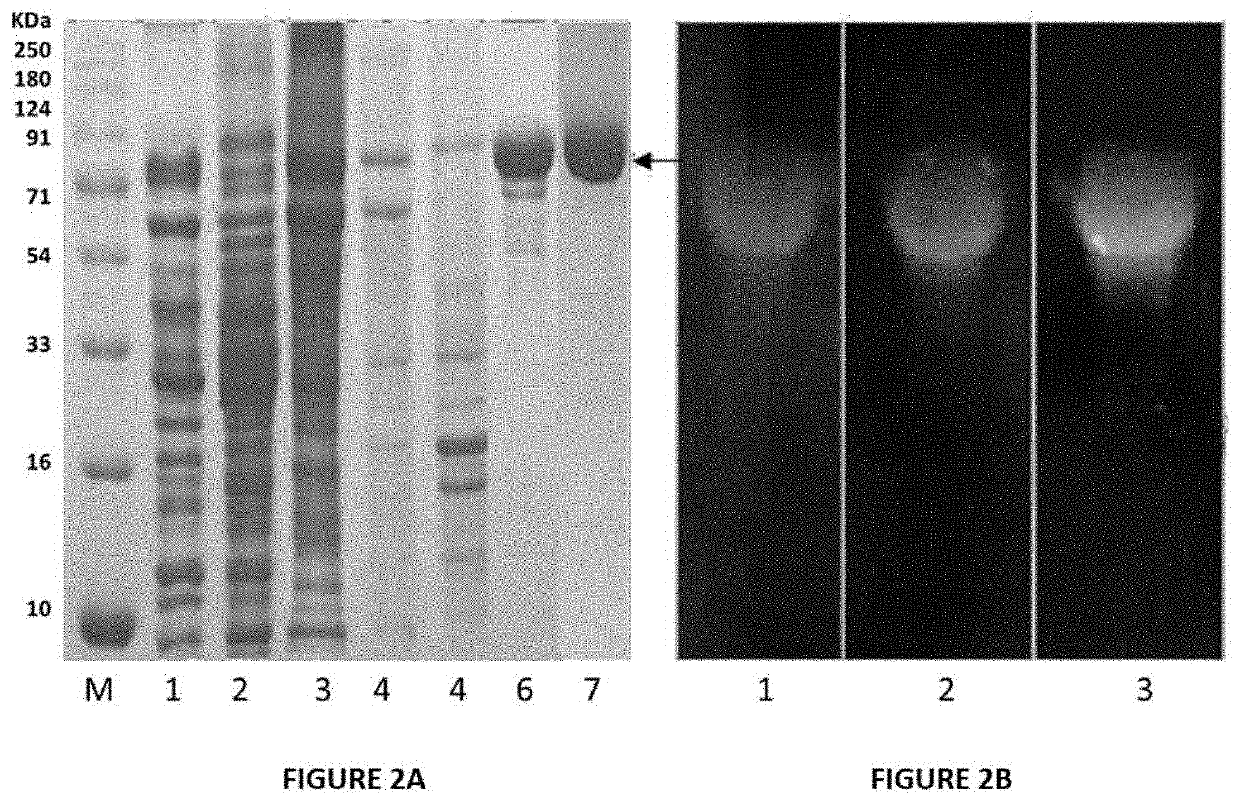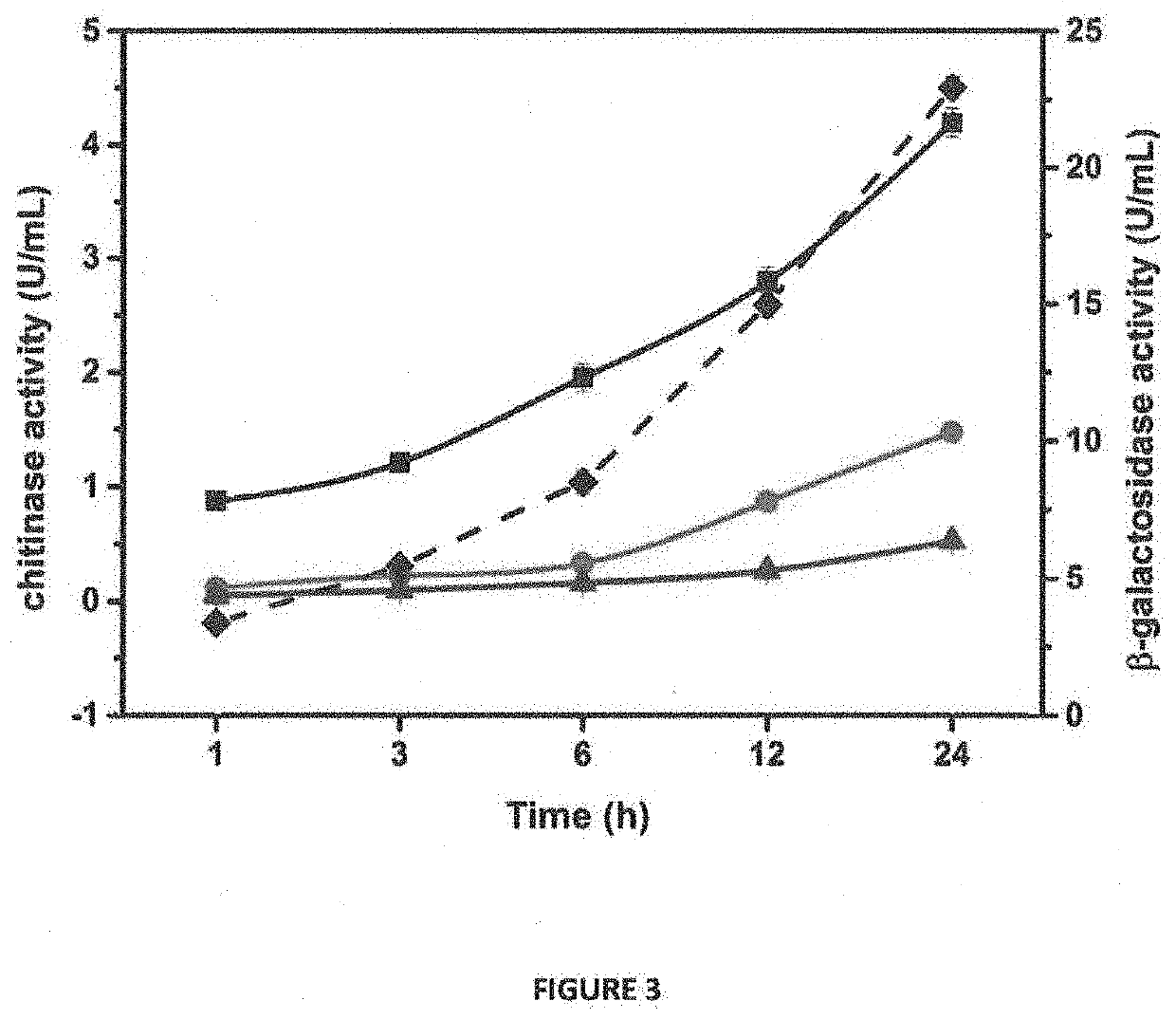Modified chitinase from Brevibacillus laterosporus LAK 1210 and uses thereof
a technology of chitinase and brevibacillus laterosporus, which is applied in the field of chitinase modification from i > brevibacillus laterosporus /i > lak 1210, and novel chitinase enzyme-based technology, to achieve the effect of improving the degrading effect and being easier to penetra
- Summary
- Abstract
- Description
- Claims
- Application Information
AI Technical Summary
Benefits of technology
Problems solved by technology
Method used
Image
Examples
example 1
Genomic DNA Extraction and PCR Amplification of Chitinase Gene, B / Chi
PCR Amplification of B / Chi Gene from Brevibacillus laterosporus Lak 1210 (FIG. 1)
[0125]Genomic DNA was extracted from Brevibacillus laterosporus Lak1210 (MTCC 5487) as described by Pospiech and Neumann. Briefly, cells of Brevibacillus laterosporus were grown in Nutrient Broth with 1% colloidal chitin at 30 C and 200 rpm. Cells were pelleted down and resuspended in 0.5 ml of saline-EDTA (150 mM NaCl, 100 mM EDTA) containing 30 mg / ml lysozyme and 40 mg / ml of RNase. Following incubation at 65° C. for 15 min, proteinase K was added to a concentration of 200 mg / ml followed by 10 ml of a 25% sodium dodecyl sulfate (SDS) solution. After incubating at 65° C. for 15 min, the resulting lysate was chilled briefly on ice and then extracted with phenol-chloroform method.
[0126]The extracted genomic DNA was used as a template to amplify chitinase gene. BLASTX analysis (http: / / www.ncbi.nlm.nih.gov / blast) was performed for selectin...
example 2
cted Mutagenesis, Cloning and Construction of Expression Plasmid pET / BRLA_Chi 90
[0132]Site directed mutagenesis was carried out by overlapping extension-PCR using pET / BRLA_Chi 90 expression plasmid as a template. A single point mutation were introduced to the full length ORF (2583 bp) that was previously cloned into the pET 21 b expression vector to modify the gene sequence using mutagenic primers to generate a restriction site suitable for Nde 1 and xho 1.
[0133]The forward mutagenic primers used for site directed mutagenesis are:
[0134]
5′-CTTATTGCCAAGCACATGATCAGGATGGAC-3′andGCAGCAACCCCACATGATGCTTCAAATAG.The reverse sequence is5′-GTCCATCCTGATCATGTGCTTGGCAATAAGandCTATTTGAAGCATCATGTGGGGTTGCTGC-3′.
[0135]The nucleotide underlined represents the mutated nucleotide and the sequences underlined CACATG and CATGTG represents the restriction site for the enzymes Nde I and xho I, respectively. The mutant clones were selected after sequencing the entire open reading frame to ensure that the desi...
example 3
n, Large Scale Production and Purification of Recombinant, Modified Chitinase, BRLA_Chi 90
SDS-PAGE Analysis of Recombinant, Modified Chitinase, BRLA_Chi 90 (FIG. 2A)
[0139]For protein expression, large scale production and purification, positive clones of Escherichia E. coli BL21(DE3) harboring the pET / BRLA_Chi 90 vector were grown in Terrific Broth medium supplemented with 100 μg / ml ampicillin at 37° C. to OD600 nm of 1.0. Expression of pET / BRLA_Chi 90 was induced with 0.1 mM IPTG and the cells were grown for different time intervals to optimize the overexpression and extracellular secretion of the recombinant chitinase. To analyze expression levels of the secretory protein and the optimal post-induction time for harvesting the cells, the culture supernatant was collected at 1, 2, 3, 6, 8 and 12 h and the protein samples were analyzed by 12% sodium dodecyl sulfate polyacrylamide gel electrophoresis (SDS-PAGE). The cells were harvested after 6 h, post-induction by centrifugation at 8...
PUM
| Property | Measurement | Unit |
|---|---|---|
| molecular mass | aaaaa | aaaaa |
| molecular weight | aaaaa | aaaaa |
| temperature | aaaaa | aaaaa |
Abstract
Description
Claims
Application Information
 Login to View More
Login to View More - R&D
- Intellectual Property
- Life Sciences
- Materials
- Tech Scout
- Unparalleled Data Quality
- Higher Quality Content
- 60% Fewer Hallucinations
Browse by: Latest US Patents, China's latest patents, Technical Efficacy Thesaurus, Application Domain, Technology Topic, Popular Technical Reports.
© 2025 PatSnap. All rights reserved.Legal|Privacy policy|Modern Slavery Act Transparency Statement|Sitemap|About US| Contact US: help@patsnap.com



